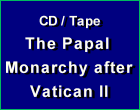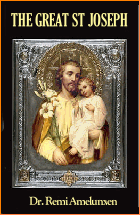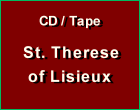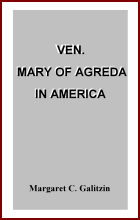Catholic Customs
 |
 |
 |
 |
 |
 |
 |
Can One Pray the Rosary during Mass?
There are many Catholics who believe that praying the Rosary during Mass constitutes a distraction from the Sacred Liturgy. The post Vatican II Church recommends
active participation during the Mass so emphatically that anything that encourages individual recollection and impairs communitarian activity is strongly discouraged.
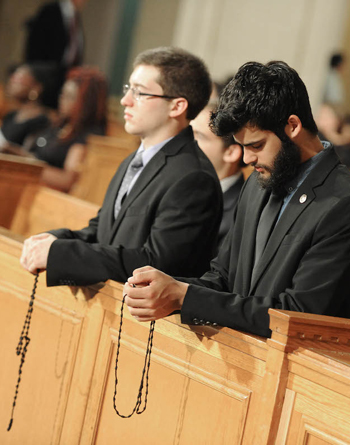 Today, Catholic forums are littered with questions from the faithful, typically younger Novus Ordo Catholics, asking if it really is allowed for an elderly parishioner in their Church to be praying the Rosary instead of actively engaging in the responses, singing and hand-holding participation of a New Mass.
Today, Catholic forums are littered with questions from the faithful, typically younger Novus Ordo Catholics, asking if it really is allowed for an elderly parishioner in their Church to be praying the Rosary instead of actively engaging in the responses, singing and hand-holding participation of a New Mass.
There are many Catholics who view the Mass-time Rosary with suspicion, as if it is some foreign stain against the Faith that has thrived on ignorance in spite of the priests who seek its elimination.
What this mindset reveals is the tyranny of the post-Conciliar Church in eliminating practices that oppose its ideal of “active participation.” It is a sad consequence to see that so many Catholics now look down on the Mass-time Rosary.
Though it may come as a surprise to some, the practice of praying the Rosary during the celebration of the Mass was not only permitted but encouraged by past Popes and Roman Curia.
A traditional rationale
As many as there are different men there are different tastes.
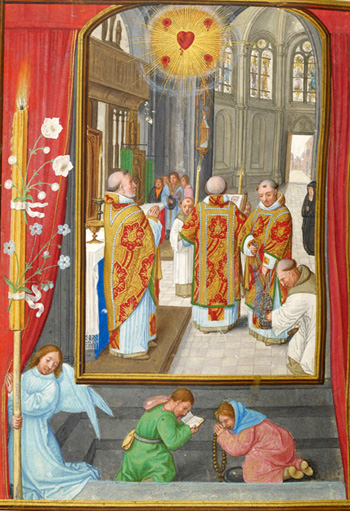 This applies not only to food and art, but also to devotions. With the differing strengths and weaknesses of a person’s individuality, we may find ourselves more attracted to one kind of devotion over another. Whereas one person may find a type of prayer or meditation to be most fruitful in the pursuit of sanctity, another may find that same practice deadening. It is characteristic of the universality of the Catholic Church that there are many different meditations, prayers, books and religious practices established to suit the needs of the many. No one who seeks earnestly for prayers and meditations can find the Barque of St. Peter meager in providing such supplies.
This applies not only to food and art, but also to devotions. With the differing strengths and weaknesses of a person’s individuality, we may find ourselves more attracted to one kind of devotion over another. Whereas one person may find a type of prayer or meditation to be most fruitful in the pursuit of sanctity, another may find that same practice deadening. It is characteristic of the universality of the Catholic Church that there are many different meditations, prayers, books and religious practices established to suit the needs of the many. No one who seeks earnestly for prayers and meditations can find the Barque of St. Peter meager in providing such supplies.
Praying the Rosary during Mass thus existed as an honored devotion that served many of the faithful. Prior to Vatican II, prayers and devotions during Mass were considered good to the degree that they elevated one’s soul to God. Those who did not have a Missal or did not want to use one could pray the Rosary as a means to elevate their minds to God and in this way unite themselves with the mysteries that were being renewed on the Altar.
Although following Mass with the Missal is a good practice, the Rosary offers also a good practice to anyone who was thus so inclined. Whether it was through necessity or one’s personal preferences, the Rosary always offered a means to gather much spiritual grace if prayed during Mass attendance. It is said there is no better time for prayer than the Mass and, before Vatican II, it was common to see Catholics praying the Rosary during the Liturgical Celebration. The Mass-time Rosary is still a common practice in many countries to this day.
Pius XII: Catholics can say the prayers they want during Mass
To pray the Rosary during Mass is not merely a custom that developed organically. Papal mandate provided strong support to it. In 1947 Pope Pius XII approved praying the Rosary during Mass in his Encyclical Mediator Dei. This document acknowledged that the same forms of following the Mass do not appeal universally to the varying inclinations of men.
It was in order to foster Mass time devotion that, through this document, he reinforced that old habit when he gave permission for the praying of the Rosary during Mass. Teaching generically, he included such prayer and its correspondent meditations among other prayers also permitted and in harmony with the Mass and not a distraction from it:
“Moreover, the needs and inclinations of all are not the same, nor are they always constant in the same individual. Who, then, would say, on account of such a prejudice, that all these Christians cannot participate in the Mass nor share its fruits? On the contrary, they can adopt some other method which proves easier for certain people; for instance, they can lovingly meditate on the mysteries of Jesus Christ or perform other exercises of piety or recite prayers which, though they differ from the sacred rites, are still essentially in harmony with them.” (Encyclical Mediator Dei, 11/20/1947, n. 108)
These words of Pius XII were quite clear in allowing anyone to say the Rosary or other prayers during Mass. However, an even stronger and more explicit endorsement supports the same custom.
Leo XIII recommends the Rosary to be said during Mass
In 1883 Pope Leo XIII had written these words in his Encyclical Supremi Apostolatus:
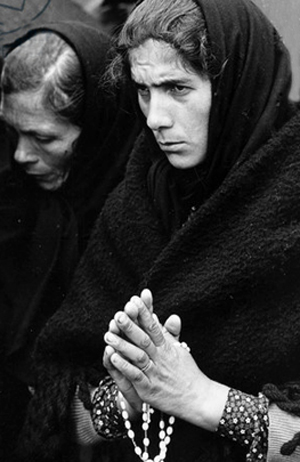 “Not only do we earnestly exhort all Christians to give themselves to the recital of the pious devotion of the Rosary publicly or privately in their own house and family, and that unceasingly, but we also desire that the whole of the month of October in this year should be consecrated to the Holy Queen of the Rosary. We decree and order that in the whole Catholic world, during this year, the devotion of the Rosary shall be solemnly celebrated by special and splendid services.
“Not only do we earnestly exhort all Christians to give themselves to the recital of the pious devotion of the Rosary publicly or privately in their own house and family, and that unceasingly, but we also desire that the whole of the month of October in this year should be consecrated to the Holy Queen of the Rosary. We decree and order that in the whole Catholic world, during this year, the devotion of the Rosary shall be solemnly celebrated by special and splendid services.
"From the first day of next October, therefore, until the second day of the November following, in every parish and, if the ecclesiastical authority deem it opportune and of use, in every chapel dedicated to the Blessed Virgin – let five decades of the Rosary be recited with the addition of the Litany of Loreto.
“We desire that the people should frequent these pious exercises; and we will that either Mass shall be said at the altar, or that the Blessed Sacrament shall be exposed to the adoration of the faithful, Benediction being afterwards given with the Sacred Host to the pious congregation. We highly approve of the confraternities of the Holy Rosary of the Blessed Virgin going in procession, following ancient custom, through the town, as a public demonstration of their devotion. And in those places where this is not possible, let it be replaced by more assiduous visits to the churches, and let the fervor of piety display itself by a still greater diligence in the exercise of the Christian virtues.” (English edition, 9/1/1883 n. 8)
On August 20, 1885 the Prefect of the Congregation of the Rites under Leo XIII issued another document, an urbis et orbis decree [for the city and for the world] , dedicating the month of October to Our Lady of the Rosary. In that pronouncement he called for the Rosary to be recited during the rituals of the Mass. The Sacred Congregation of Rites reinforced this on January 16, 1886, when it answered a question on how specifically to apply the Pope’s recommendation.
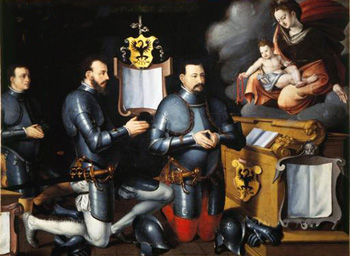 The question put to the Sacred Congregation of the Rites and the answer it gave read:
The question put to the Sacred Congregation of the Rites and the answer it gave read:
“Doubt V – The same Decree [of Leo XIII issued on August 20, 1885] rules that Rosary must be recited with the Litanies among the prayers carried out by the faithful. We ask whether these words should be understood as the Rosary to be said at the same time of the celebration of the Mass; or that the Mass should be celebrated before the recitation of the Rosary and Litanies as usually happens in the Palentina Diocese.
“Answer: Affirmative to the first part; negative to the second.” (Original in Latin here, pp. 47-48 )
As such, this decree unambiguously stated affirmative: the Rosary is to be prayed during the same time as the celebration of the Mass.
This endorsement by Leo XIII and its confirmation by the Congregation of Rites definitively established the Rosary as a legitimate accompaniment to the Mass. Several indulgences were granted to its recitation, and the Sacred Congregation of Rites confirmed this position again in 1887.
An objection
An objection could be raised that these pronouncements of Pope Leo XIII dealt specifically with the recitation of the Rosary during Masses in October.
To this we respond that while the aforementioned declaration established the recitation of the Mass-time Rosary for October, it made evident that the Rosary is essentially an acceptable form of worship to accompany the Mass in general.
The papal declaration granted special indulgences to doing so in October, and by extension showed that there is no conflict with praying the Rosary during Mass. Since this established that the Rosary is in harmony with the liturgy, not in opposition to it, it becomes clear that the Rosary is a perfectly acceptable devotion during Mass for anyone who is so inclined to pray it.
Pope Pius XII reinforced this position with Mediator Dei, including prayer of the Rosary in those devotions that are cooperative with the Mass.
Conclusion
The Mass-time Rosary is a devotion that assists the supplicant in raising his spirit to God. As a practice it provides a legitimate spiritual means for those who are so inclined to say it. Pius XII endorsed the Rosary as an appropriate means of assisting at Mass and Leo XIII also did so by allowing it to be said during Mass and by granting indulgences to do the same during the month of October.
Progressivist hierarchy and clergy today despise anything that detracts from their ideal of “active participation,” yet, despite their hatred, the practice of praying the Rosary during Mass is a firmly established tradition that has the approval of past Popes and the Sacred Congregation of Rites.
To unite oneself with the Mass by praying the Rosary and meditating on its mysteries thus continues to stand as a legitimate, praiseworthy and respectable custom of the Holy Catholic Church. Let those who so wish honor Our Lady and Our Lord in this way.


You can pray the Rosary not only before Mass but during Mass; it is an approved custom
There are many Catholics who view the Mass-time Rosary with suspicion, as if it is some foreign stain against the Faith that has thrived on ignorance in spite of the priests who seek its elimination.
What this mindset reveals is the tyranny of the post-Conciliar Church in eliminating practices that oppose its ideal of “active participation.” It is a sad consequence to see that so many Catholics now look down on the Mass-time Rosary.
Though it may come as a surprise to some, the practice of praying the Rosary during the celebration of the Mass was not only permitted but encouraged by past Popes and Roman Curia.
A traditional rationale
As many as there are different men there are different tastes.

A 15th century prayer books shows the faithful at Mass - one with a prayerbook, the other with a Rosary
Praying the Rosary during Mass thus existed as an honored devotion that served many of the faithful. Prior to Vatican II, prayers and devotions during Mass were considered good to the degree that they elevated one’s soul to God. Those who did not have a Missal or did not want to use one could pray the Rosary as a means to elevate their minds to God and in this way unite themselves with the mysteries that were being renewed on the Altar.
Although following Mass with the Missal is a good practice, the Rosary offers also a good practice to anyone who was thus so inclined. Whether it was through necessity or one’s personal preferences, the Rosary always offered a means to gather much spiritual grace if prayed during Mass attendance. It is said there is no better time for prayer than the Mass and, before Vatican II, it was common to see Catholics praying the Rosary during the Liturgical Celebration. The Mass-time Rosary is still a common practice in many countries to this day.
Pius XII: Catholics can say the prayers they want during Mass
To pray the Rosary during Mass is not merely a custom that developed organically. Papal mandate provided strong support to it. In 1947 Pope Pius XII approved praying the Rosary during Mass in his Encyclical Mediator Dei. This document acknowledged that the same forms of following the Mass do not appeal universally to the varying inclinations of men.
It was in order to foster Mass time devotion that, through this document, he reinforced that old habit when he gave permission for the praying of the Rosary during Mass. Teaching generically, he included such prayer and its correspondent meditations among other prayers also permitted and in harmony with the Mass and not a distraction from it:
“Moreover, the needs and inclinations of all are not the same, nor are they always constant in the same individual. Who, then, would say, on account of such a prejudice, that all these Christians cannot participate in the Mass nor share its fruits? On the contrary, they can adopt some other method which proves easier for certain people; for instance, they can lovingly meditate on the mysteries of Jesus Christ or perform other exercises of piety or recite prayers which, though they differ from the sacred rites, are still essentially in harmony with them.” (Encyclical Mediator Dei, 11/20/1947, n. 108)
These words of Pius XII were quite clear in allowing anyone to say the Rosary or other prayers during Mass. However, an even stronger and more explicit endorsement supports the same custom.
Leo XIII recommends the Rosary to be said during Mass
In 1883 Pope Leo XIII had written these words in his Encyclical Supremi Apostolatus:

Pilgrims praying the Rosary at Fatima
"From the first day of next October, therefore, until the second day of the November following, in every parish and, if the ecclesiastical authority deem it opportune and of use, in every chapel dedicated to the Blessed Virgin – let five decades of the Rosary be recited with the addition of the Litany of Loreto.
“We desire that the people should frequent these pious exercises; and we will that either Mass shall be said at the altar, or that the Blessed Sacrament shall be exposed to the adoration of the faithful, Benediction being afterwards given with the Sacred Host to the pious congregation. We highly approve of the confraternities of the Holy Rosary of the Blessed Virgin going in procession, following ancient custom, through the town, as a public demonstration of their devotion. And in those places where this is not possible, let it be replaced by more assiduous visits to the churches, and let the fervor of piety display itself by a still greater diligence in the exercise of the Christian virtues.” (English edition, 9/1/1883 n. 8)
On August 20, 1885 the Prefect of the Congregation of the Rites under Leo XIII issued another document, an urbis et orbis decree [for the city and for the world] , dedicating the month of October to Our Lady of the Rosary. In that pronouncement he called for the Rosary to be recited during the rituals of the Mass. The Sacred Congregation of Rites reinforced this on January 16, 1886, when it answered a question on how specifically to apply the Pope’s recommendation.

The Christ Child offers the Rosary to three Teutonic knights
“Doubt V – The same Decree [of Leo XIII issued on August 20, 1885] rules that Rosary must be recited with the Litanies among the prayers carried out by the faithful. We ask whether these words should be understood as the Rosary to be said at the same time of the celebration of the Mass; or that the Mass should be celebrated before the recitation of the Rosary and Litanies as usually happens in the Palentina Diocese.
“Answer: Affirmative to the first part; negative to the second.” (Original in Latin here, pp. 47-48 )
As such, this decree unambiguously stated affirmative: the Rosary is to be prayed during the same time as the celebration of the Mass.
This endorsement by Leo XIII and its confirmation by the Congregation of Rites definitively established the Rosary as a legitimate accompaniment to the Mass. Several indulgences were granted to its recitation, and the Sacred Congregation of Rites confirmed this position again in 1887.
An objection
An objection could be raised that these pronouncements of Pope Leo XIII dealt specifically with the recitation of the Rosary during Masses in October.
To this we respond that while the aforementioned declaration established the recitation of the Mass-time Rosary for October, it made evident that the Rosary is essentially an acceptable form of worship to accompany the Mass in general.
The papal declaration granted special indulgences to doing so in October, and by extension showed that there is no conflict with praying the Rosary during Mass. Since this established that the Rosary is in harmony with the liturgy, not in opposition to it, it becomes clear that the Rosary is a perfectly acceptable devotion during Mass for anyone who is so inclined to pray it.
Pope Pius XII reinforced this position with Mediator Dei, including prayer of the Rosary in those devotions that are cooperative with the Mass.
Conclusion
The Mass-time Rosary is a devotion that assists the supplicant in raising his spirit to God. As a practice it provides a legitimate spiritual means for those who are so inclined to say it. Pius XII endorsed the Rosary as an appropriate means of assisting at Mass and Leo XIII also did so by allowing it to be said during Mass and by granting indulgences to do the same during the month of October.
Progressivist hierarchy and clergy today despise anything that detracts from their ideal of “active participation,” yet, despite their hatred, the practice of praying the Rosary during Mass is a firmly established tradition that has the approval of past Popes and the Sacred Congregation of Rites.
To unite oneself with the Mass by praying the Rosary and meditating on its mysteries thus continues to stand as a legitimate, praiseworthy and respectable custom of the Holy Catholic Church. Let those who so wish honor Our Lady and Our Lord in this way.

Posted January 6, 2017
______________________
______________________



